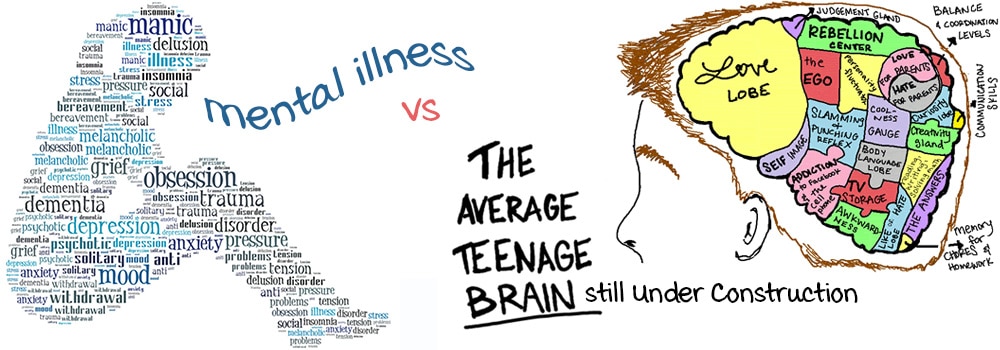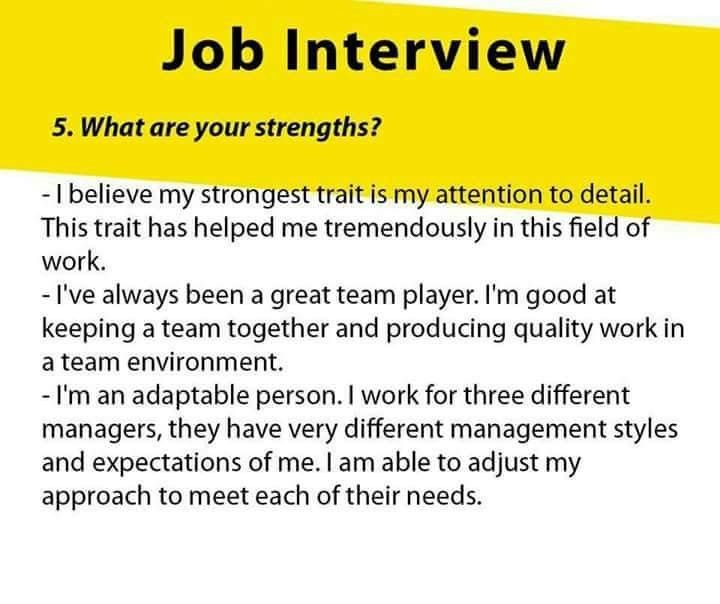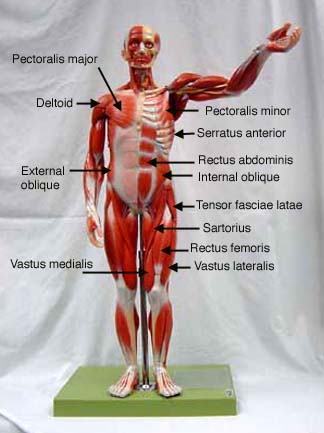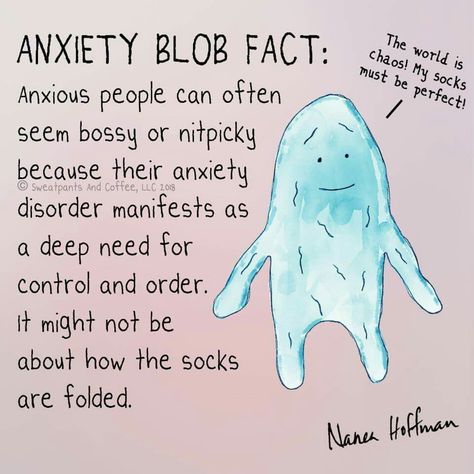Work anxiety stress
Workplace Anxiety: Causes, Symptoms, and Treatment
Written by Madeline Laguaite
If you find yourself getting stressed at work, know that it happens to everyone and it’s completely normal. But if you realize that stress is constant, overwhelming, and prevents you from living your life, it could be an anxiety disorder.
Having anxiety at work can have a huge impact on you and your career. People who feel anxious at work might even make career decisions based on their anxiety. For example, you might feel like you have to turn down a promotion if it involves more managing, public speaking, or traveling to new places.
If you have workplace anxiety, you might have symptoms like:
- Avoiding friends or family
- Constant worrying
- Crying
- Feeling irritable, tired, or tense
- Feeling like you need to be perfect
- Having trouble sleeping
- Having trouble concentrating or remembering things
- Losing interest in your work
- Overeating or undereating
What Causes Workplace Anxiety?
Lots of things can cause anxiety in the workplace. Darcy E. Gruttadaro, JD, the director of the Center for Workplace Mental Health at the American Psychiatric Association Foundation, says anxiety disorders are the most common mental health condition in the United States.
“It’s not uncommon for people to feel nervous about a big presentation, meeting with clients, or working directly with senior leaders,” Gruttadaro says. “Anxiety disorders involve more extreme, often crippling, and persistent levels of fear, apprehension, and worry.”
In fact, co-workers and managers might not realize a person they work with has an anxiety disorder. Gruttadaro says some red flags that might suggest a person has an anxiety disorder include:
- A drop in performance
- Excessive missed days of work
- Not appearing engaged in work
- Physical complaints, like sweating, upset stomach, and not sleeping well (without another explanation)
- Poor job productivity
Debra Kissen, PhD, a clinical psychologist, says it can be helpful to take a look at how you’re feeling throughout the workday.
“[Evaluate your anxiety] in terms of how severe it is and how disabling,” Kissen says. “Maybe it’s showing up and you’re still operating pretty effectively or when you’re feeling that way, maybe you’re only 10% as effective as you would be otherwise.”
The root cause of anxiety at work depends on the person. For some people, extra-long work hours, high stress, a lack of support from managers and co-workers, and related factors can lead to someone developing anxiety at work, Gruttadaro says.
Other situations that might make you anxious include:
- Dealing with issues at work
- Giving presentations
- Keeping up with personal relationships
- Meetings, staff lunches, and office parties
- Meeting and setting deadlines
- Speaking up during meetings
Managing Anxiety at Work
Luckily, there are lots of things you can do to manage your anxiety and stress at work.
For example, Kissen suggests keeping a log to figure out what type of anxiety you’re having. Start by tracking moments where you feel uncomfortable or anxious during the workday.
Start by tracking moments where you feel uncomfortable or anxious during the workday.
“Maybe there are some trends, like it’s really more in the beginning of the day when you’re first looking at everything that’s due, or maybe it’s at the end of the day when you still have so much on your plate but you really need to leave to pick up your kids,” she says.
Listening to your internal voice and facing some of those anxious thoughts can help, too.
“If your mind says, ‘Oh, they definitely think I’m stupid,’ or ‘Oh, they just ignored me.’ Is there any other explanation they went by your desk or didn’t hear you on the Zoom call?” Kissen says. “So we’re not just trying to convince ourselves everything’s OK, but we want to have a more realistic interpretation versus catastrophic.”
Here are a few more tips:
- Adopt healthy habits. Getting enough sleep, eating healthfully, regularly exercising, and not drinking too much alcohol or caffeine can help keep your mind and body shipshape.
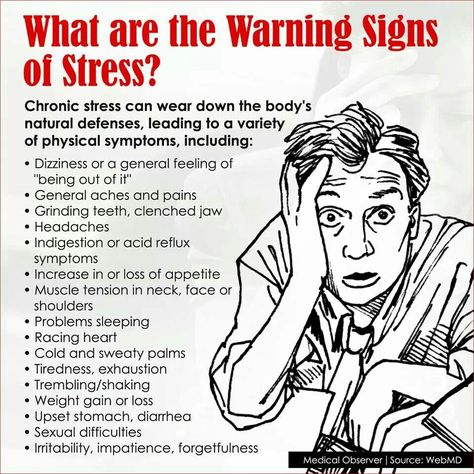
- Be organized. Although clearing your computer and desk might not seem high priority, staying organized will do wonders for you in the long run.
- Be honest with yourself. If you don’t have enough time for it, don’t take on tasks, projects, and assignments you don’t have the time to handle.
- Communicate. Ask for help if you need it. If you have too much to handle, speak up. Your manager might not realize you’re spread too thin.
- Celebrate your successes. Before moving to the next task or project, take a second to celebrate your work and thank the people who helped you.
- Educate yourself. Learn to spot signs of anxiety and get an idea of how to handle those symptoms at work.
- Get it right the first time. Spend a little extra time nailing it the first go around. This can help in the long run as you won’t have to redo your hard work.
- Prepare and plan.
 If you have any major projects, get started on them early and set mini deadlines for yourself. It can also help to prepare for issues that might crop up and try to prevent them.
If you have any major projects, get started on them early and set mini deadlines for yourself. It can also help to prepare for issues that might crop up and try to prevent them. - Set clear boundaries. Don’t bring work home with you. For example, make it a rule not to check your voicemail or work email once you leave the workplace.
- Steer clear of toxic co-workers. Don’t listen to gossip or negativity in your workplace.
- Take breaks when you need to. Try some deep-breathing techniques or take a walk to clear your head. This also includes vacations. Chances are, you’ll feel refreshed and ready to get back to it once you return.
- Tell a co-worker you trust. Having someone at work who knows about your anxiety can be comforting, and it might ease some of that stress and fear.
- Use your time management skills. Practicing time management can help alleviate some of the anxiety.
 Try using to-do lists to prioritize your tasks. These lists can also ensure you set aside enough time to finish each task.
Try using to-do lists to prioritize your tasks. These lists can also ensure you set aside enough time to finish each task. - Work. Busying yourself with work can boost your self-esteem and add to your social identity, not to mention earning needed income.
Telling Your Employer
Whether or not you tell your employer about your anxiety at work is completely up to you. Maybe you need accommodations or want to educate people about what you’re going through.
The Americans with Disabilities Act (ADA) protects people with a physical or mental disability who are qualified for the job. This can protect you from job discrimination. An employer can’t refuse to hire you because of a disability that prevents you from doing things that aren’t essential to your role at work.
If you’re an employer, making sure that your employees have access to mental health services and support is important, Gruttadaro says.
She also suggests a few other things employers can do to support their employees:
- Educate the workforce and managers.
 “The more visible you make information about mental health conditions like anxiety, the more likely employees will feel psychologically safe in seeking treatment,” Gruttadaro says.
“The more visible you make information about mental health conditions like anxiety, the more likely employees will feel psychologically safe in seeking treatment,” Gruttadaro says. - Encourage employees to use the Employee Assistance Program (EAP). Reminding employees about the mental health benefits available can help. Normalizing anxiety as common, and encouraging your workforce to get help when needed is also a good idea, Gruttadaro says.
- Support managers in supporting employees with anxiety. “This includes working with managers on strategies to manage with empathy and compassion. This may not come naturally to all managers,” Gruttadaro says. “Remind managers that a supportive workplace helps build employee loyalty, dedication, and engagement to perform well for the organization, which ultimately benefits everyone.”
Kissen says that coming up with an accommodation that meets both the employee’s and the employer’s needs is a win-win scenario. For example, if your supervisor verbally assigns you multiple tasks and you find it overwhelming, you could ask that supervisor if it would be possible to email you the tasks as well.
For example, if your supervisor verbally assigns you multiple tasks and you find it overwhelming, you could ask that supervisor if it would be possible to email you the tasks as well.
“If you can have someone who’s less burned out and less stressed, the employee wins and the employer wins,” she says. “Maybe there’s a little bit of a tweak in a role. Maybe you’re doing something that you’re OK at, but you really have another strength ... you could find a way to tap into.”
Ways to Get Help
Anxiety and stress shouldn’t be ignored. Professionals like counselors and therapists can help you feel better. They might recommend regular therapy sessions, medication, or other treatment.
Anxiety and Stress in the Workplace
Boost Search Results
On
Having an anxiety disorder can make a major impact in the workplace. People may turn down a promotion or other opportunity because it involves travel or public speaking; make excuses to get out of office parties, staff lunches, and other events or meetings with coworkers; or be unable to meet deadlines.
In a national survey on anxiety in the workplace, people with anxiety disorders commonly cited these as difficult situations: dealing with problems; setting and meeting deadlines; maintaining personal relationships; managing staff; participating in meetings, and making presentations.
Tell Your Employer?
It’s your decision to tell your employer about your anxiety disorder. Some people do so because they need accommodations, others want to educate people about their condition, and some do not want to hide their illness.
If you have a physical or mental disability and are qualified to do a job, the Americans with Disabilities Act of 1990 (ADA) protects you from job discrimination. Being qualified means you must satisfy an employer’s requirements for the job and be able to perform essential functions on your own or with reasonable accommodation. An employer cannot refuse to hire you because your disability prevents you from performing duties that are not essential to the job. Find out more about employment rights.
Find out more about employment rights.
Tips to Manage Stress and Anxiety at Work
Getting stressed out at work happens to everyone, and it’s perfectly normal. But stress that is persistent, irrational, and overwhelming and impairs daily functioning may indicate an anxiety disorder. Keep these ideas in mind to keep your work life manageable:
- Work! In addition to financial reasons, working can be important for your self-esteem and it adds to your social identity.
- Tell a trusted coworker. Knowing that someone accepts your condition can be comforting and it may reduce any anticipatory anxiety about having a panic attack at work.
- Educate yourself. Learn to recognize the symptoms of your disorder and how to handle them if you experience any at work.
- Practice time management. Make to-do lists and prioritize your work. Schedule enough time to complete each task or project.
- Plan and prepare. Get started on major projects as early as possible.
 Set mini-deadlines for yourself. Anticipate problems and work to prevent them.
Set mini-deadlines for yourself. Anticipate problems and work to prevent them. - Do it right the first time. Spend the extra time at the outset and save yourself a headache later when you have to redo your work.
- Be realistic. Don’t over commit or offer to take on projects if you don’t realistically have enough time.
- Ask for help. If you’re feeling overwhelmed, ask a coworker for help. Later you can return the favor.
- Communicate. Speak up calmly and diplomatically if you have too much to handle. Your supervisor may not realize you’re overextended.
- Stay organized. Filing and clearing your desk and computer desktop may rank low on your priority list, but they can save you time in the long run and may prevent a crisis later.
- Avoid toxic coworkers. Try to ignore negativity and gossip in your workplace.
- Take breaks. A walk around the block or a few minutes of deep breathing can help clear your head.
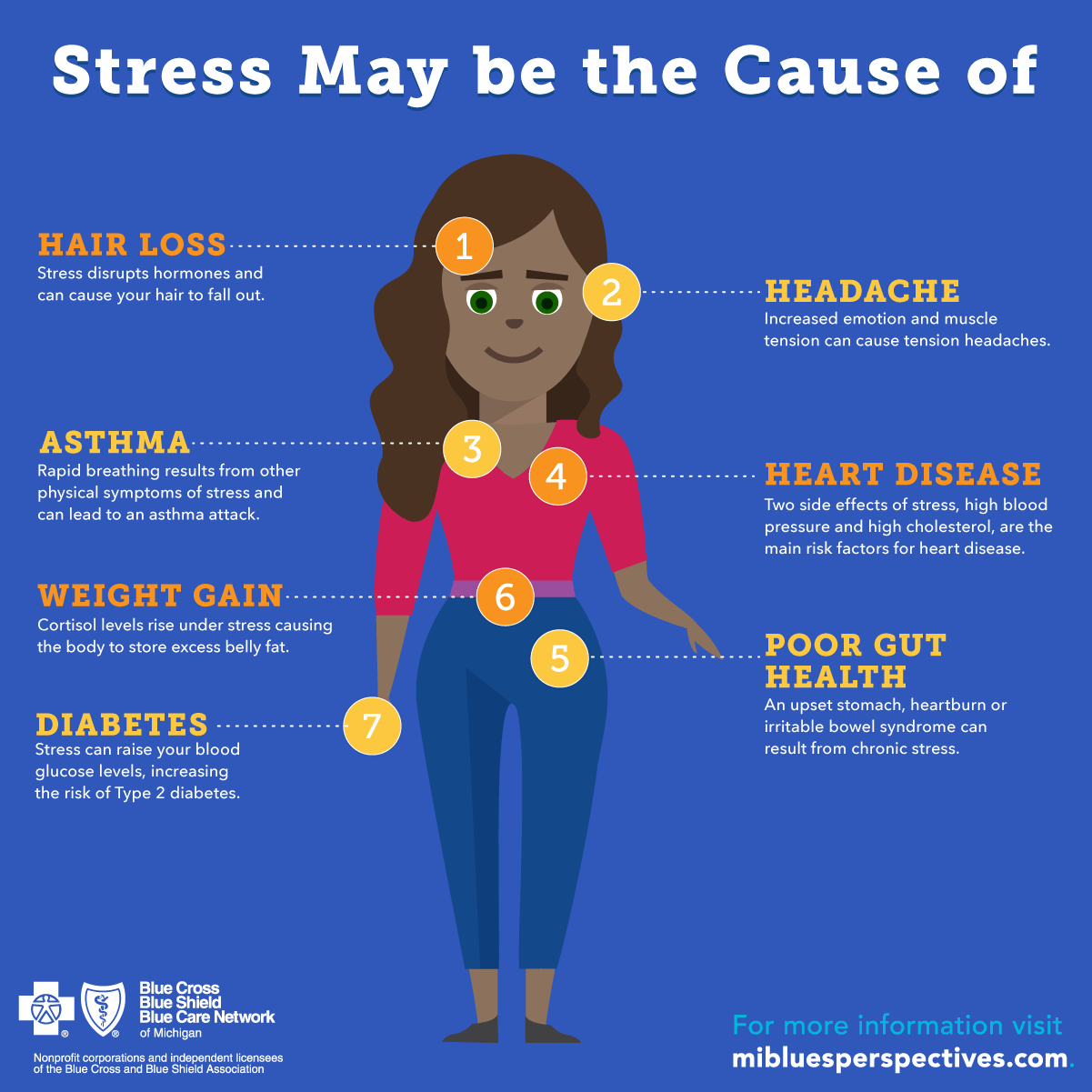
- Set boundaries. Try not to bring work home with you. Don’t check your work e-mail or voice mail after hours.
- Savor success. Take a moment to celebrate your
- good work before moving on to the next project. Thank everyone who helped you.
- Plan a vacation. You’ll be rejuvenated and ready to work when you come back.
- Take advantage of employer resources and benefits. Your workplace may offer an Employee Assistance Program (EAP), discounts to gyms, or skill-building courses. Learn what’s available to you.
- Be healthy. Eat healthfully, get enough sleep, exercise regularly, and limit caffeine and alcohol. Try to keep your body and mind in shape to handle challenging situations.
Getting Help
It’s important to find help for anxiety, stress, and related disorders. Find a therapist near you.
With treatment, most people find significant improvement. Several standard approaches have proved effective. Your health care professional will use one or a combination of these treatments:
Your health care professional will use one or a combination of these treatments:
- Therapy
- Medication
- Complementary and alternative treatment
Resources
American Psychological Association Workplace Issues
Bazelon Center for Mental Health Law
Fit Small Business: Article: How to Prevent and Deal with Discrimination in the Work Place, May 15, 2017
U.S. Equal Employment Opportunity Commission
Facts About the Americans With Disabilities Act
Mental Health America
Stress at work, ways to manage stress in the workplace. Dealing with stress after being fired - Safety Psychology
We will talk about the nature of stress at work and its causes. You will also find here interesting and necessary recommendations on ways to limit and manage stress in the workplace.
A person in a big city is in a state of constant tension. It is important to be in time everywhere and to do everything: in the morning, put yourself in order, have breakfast, send the children to school. To catch the bus, to work... The work schedule is scheduled for weeks and months in advance, so the lack of time is especially acute in the workplace. It seems that as soon as a person crosses the threshold of a checkpoint or office, he turns from a nice respectable citizen into a ferocious Cerberus, ready to tear everyone he meets. And all why? Production stress!
To catch the bus, to work... The work schedule is scheduled for weeks and months in advance, so the lack of time is especially acute in the workplace. It seems that as soon as a person crosses the threshold of a checkpoint or office, he turns from a nice respectable citizen into a ferocious Cerberus, ready to tear everyone he meets. And all why? Production stress!
And yet, despite the fact that stress is a normal part of our lives, we should not forget that constant stress at work significantly reduces productivity, physical and emotional health. That's why it's so important to find ways to keep work stress under control. Fortunately, each of us can independently limit and manage stress at work, for this it is necessary to correctly identify its signs.
Signs of stress at work
How do you know when you need to do something about work stress? Signs of occupational stress will help you with this, because the impact of stress is truly unpredictable:
Physical signs of stress at work: headache, toothache, chest pain, heart pain, shortness of breath. Increased heart rate, high blood pressure, muscle pain, indigestion, constipation or diarrhea. Increased sweating, fatigue, insomnia, decreased immunity.
Increased heart rate, high blood pressure, muscle pain, indigestion, constipation or diarrhea. Increased sweating, fatigue, insomnia, decreased immunity.
Psychosocial signs of stress at work: restlessness, irritability, sadness, anger. Frequent mood swings, hypersensitivity, apathy, depression, delayed reactions or thought spasms. Feelings of anxiety, helplessness and hopelessness.
Behavioral signs of stress at work: overeating or loss of appetite, impatience, irritability, anger, increased use of alcohol, nicotine or drugs, social withdrawal (unwillingness to interact with other people), neglect of responsibility, low work productivity, poor personal hygiene changing relationships in the family.
How do you deal with stress at work?
Following these simple guidelines, you can easily keep stress in the workplace under control:
- Be kind to colleagues and subordinates;
- Improve your communication skills - learn to speak so that you are understood exactly the way you want;
- Follow the principles of time management, learn to manage time;
- Improve your skills - be sure to attend courses and trainings planned at work;
- Regularly perform simple physical exercises before going to work: lying in bed, you can do 20 repetitions of the exercise for the abdominal muscles. Then stand up, stretch up for 10 seconds. Next, slowly do 20-30 sit-ups, and if possible, push-ups. In addition, after work, you need a light aerobic exercise, for example, a 30-minute walk at a fast pace or an hour's walk before going to bed at a calm and measured pace.
Then stand up, stretch up for 10 seconds. Next, slowly do 20-30 sit-ups, and if possible, push-ups. In addition, after work, you need a light aerobic exercise, for example, a 30-minute walk at a fast pace or an hour's walk before going to bed at a calm and measured pace.
What can I do to avoid stress at work?
When people are under occupational stress, they become angry and irritable. This condition is not the best way affects the quality of their work and productivity. That is why it is better to prevent stress than to deal with the unpredictable impact of stress on work. In addition, occupational stress not only reduces productivity, worsens relationships with management, colleagues and subordinates. Stress in the workplace has the most detrimental effect on health. After all, the most dangerous thing in stress at work is the duration and very often the lack of the possibility of an adequate response to an irritant. After all, you must admit, it is unreasonable to send the boss when he deserves it - and, as a result, stress.
Why do we experience stress at work? There are many very good reasons for occupational stress:
- Fear of being fired. Job loss and stress are certainly related concepts.
- Growth in demands from superiors without an increase in wages.
- The need to constantly maintain a certain level of work.
When stress at work reduces productivity or significantly affects your personal life, it's time to take action. First, it is important to pay attention to physical and emotional health. A healthy person is much easier to deal with stress. The better you feel, the easier it will be for you to deal with stress when work gets overwhelming.
Taking care of yourself does not require a radical change in lifestyle. Even the smallest things can lift your spirits and boost your energy levels. Take just one step and soon you will see that the amount of stress in life has been significantly reduced. After that, you may want to take other steps to achieve balance and harmony in your life.
1 step - life in motion. Sports are a sweaty yet effective way to lift your spirits, boost your energy, sharpen your focus, and relax your mind and body. For maximum relaxation, you will need 30 minutes of daily intense physical activity.
Step 2 - food is a joy. It is advisable to eat what you want right now, from which “drooling”. If possible, eat small and fractional meals in a calm, conducive environment for a meal. Food culture is an important component of a healthy diet. In addition, frequent and small snacks help maintain normal blood sugar levels - because low sugar levels make you feel anxious and irritable. We also recall that overeating makes a person lethargic and deprives of working capacity for a long time.
Step 3 - everything in moderation. It is important to reduce alcohol consumption to a minimum. Understanding that a simple overdose of alcohol reduces the performance of the human body by half for 3-4 days is a good argument in favor of moderate consumption during the working week and beyond. Smoking reduces immunity, destroys blood vessels, causes irreparable harm to the pulmonary system and reduces performance by 25-30% - draw your own conclusions. Nicotine also increases anxiety levels, and this is a direct road to depression.
Smoking reduces immunity, destroys blood vessels, causes irreparable harm to the pulmonary system and reduces performance by 25-30% - draw your own conclusions. Nicotine also increases anxiety levels, and this is a direct road to depression.
Step 4 - healthy sleep. Anxiety and stress are the main causes of insomnia. However, lack of sleep reduces performance, reaction and ability to concentrate, which inevitably leads to stress in the workplace. Insomnia compromises the ability to cope with stress. It is much easier to maintain emotional balance when you are well rested.
How to relieve stress at work? When workplace stress is on the rise, it's impossible to just ignore it. Fortunately, there are easy ways to regain control of the situation. Your ability to self-control will be perceived by others as a strength, which will lead to an improvement in your relationships with colleagues and superiors.
Here are some tips for reducing stress at work by improving organization and choosing the right life goals and professional priorities:
- Creating a balanced schedule.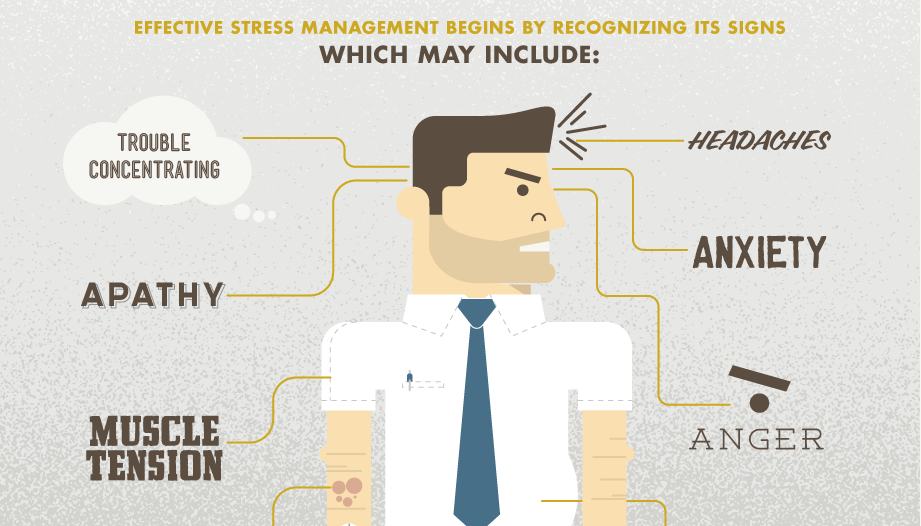 Analyze your schedule, responsibilities and daily tasks. Remember that your job should not be a survival game. Try to find a balance between work and family life, social activities and hobbies, daily responsibilities and relaxation.
Analyze your schedule, responsibilities and daily tasks. Remember that your job should not be a survival game. Try to find a balance between work and family life, social activities and hobbies, daily responsibilities and relaxation.
- Do not overload yourself. Avoid constant stress. Try not to put off many important tasks until the last day.
Wake up earlier. A reserve of 10-15 minutes will save you from the rush and morning stress. Getting up early will make your day a little longer and allow you to be more punctual.
- Take regular breaks from work. Make sure you take short breaks for your brain throughout the day. At lunch, try to leave your workplace. A short rest will help you relax, it will help you work productively.
Workplace Stress Reduction Tips:
- Priority List. Make a list of the tasks you need to complete in descending order of their importance. Focus on the highest priorities first. If you need to do something not particularly pleasant, do it as soon as possible.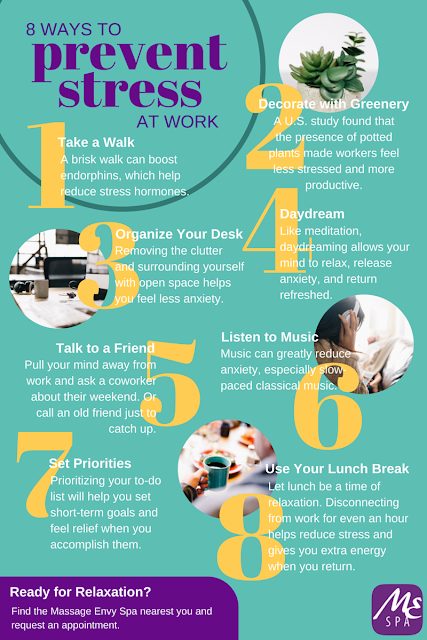 And devote the rest of the day to more pleasant activities and responsibilities.
And devote the rest of the day to more pleasant activities and responsibilities.
- Break large projects into parts. If a large project seems impossible, don't be afraid, just break it down into a large number of small stages-steps and carry them out gradually. Focus on completing each step individually, instead of thinking about everything at once.
- Delegate responsibility. You don't have to do everything. If there are people in your company who can handle one of your tasks, why not let them handle that task? Let go of the desire to independently perform and control all, even the most insignificant, tasks. And you will reduce your stress levels.
Reducing stress at work with emotional self-control
Emotional self-control in the workplace has four main components:
* Self-awareness is the ability to recognize your emotions and understand their impact on your decisions.
* Self-management - the ability to control one's emotions and behavior and adapt to changing circumstances.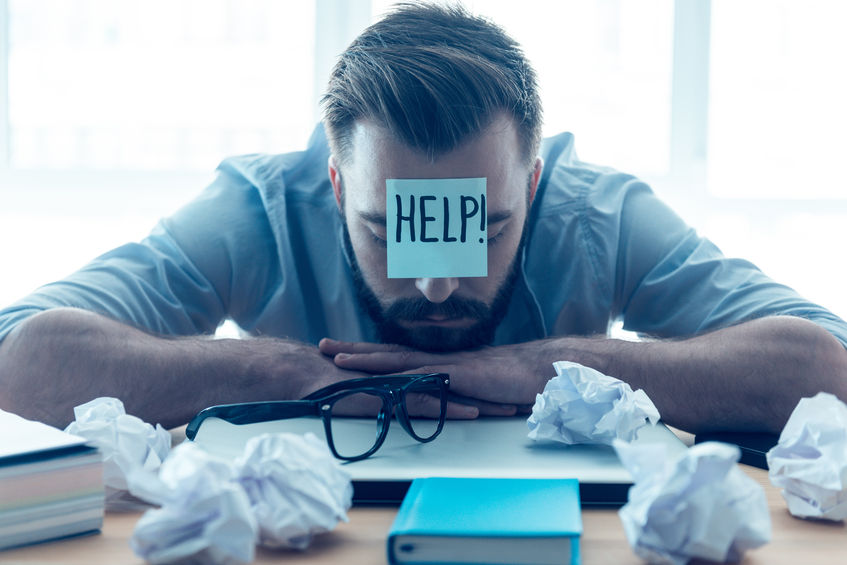
* Social consciousness - the ability to feel, understand and respond to the feelings and emotions of other people. Helps to feel comfortable in the team.
* Relationship management - the ability to inspire, influence and interact with others, the desire and ability to manage conflicts.
The greater your capacity for emotional self-control, the easier it is for you to cope with work stress. Fortunately, emotional self-control is not innate, it is something we can learn throughout our lives.
For example, changing jobs is also stressful. How to emotionally prepare yourself for a new team and survive the first time in a new place with the least emotional losses? You need to gradually develop the skills of emotional and non-verbal communication, which include the following techniques:
* Admit to yourself that you may be stressed. Prepare for stress psychologically - remember the state of inner harmony and peace. Try to learn how to enter this state in any situation.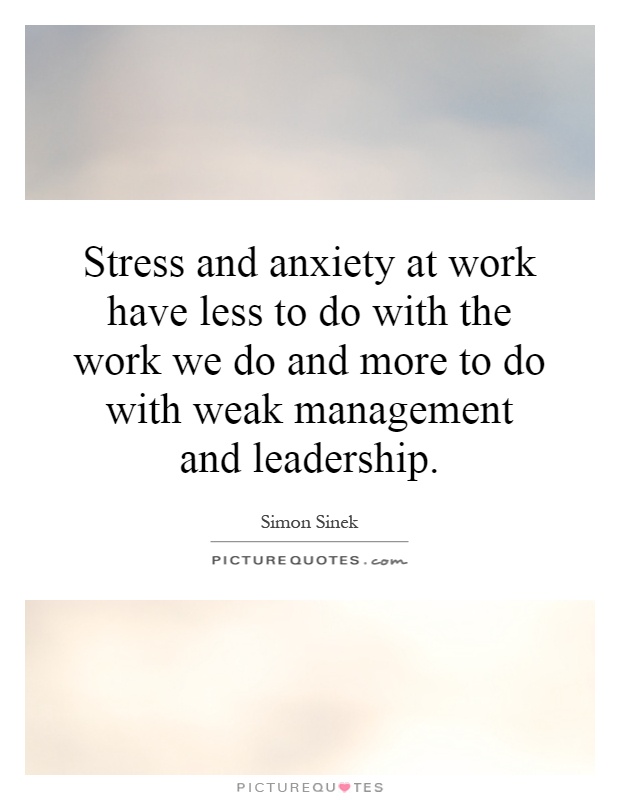 Perhaps deep breathing or memories of happy moments in life will help you with this.
Perhaps deep breathing or memories of happy moments in life will help you with this.
* Be aware of your own emotions. Say to yourself: “now I am angry” or “now I am offended”, etc. This exercise will help you remember negative emotions, realize and try to switch to a positive way. This practice will help you learn to understand not only your emotions, but also the emotions of the people around you. For example, if you recently got a job, this will help you quickly integrate into the team and understand who is who.
* Learn to recognize and use non-verbal cues effectively, which make up 95-98% of your communication process. Remember that what matters is not what you say, but how you say it.
* Laugh. Nothing clears the air like a good joke. But know the measure, because. pranks on other people can backfire. Don't make fun of your colleagues.
Learn to listen. A person who knows how to listen is very valuable.
Dealing with stress after being fired from work.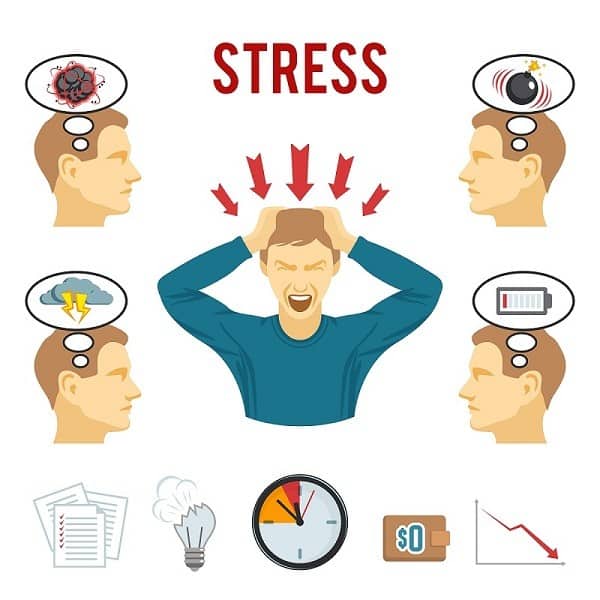
None of us is immune from the blows of fate. In our difficult times, job loss is not at all uncommon, firms close unexpectedly and many employees are not ready for such a turn, and after losing their job they fall into a deep depression and not only cannot, but also do not want to look for a new job.
There is no universal remedy for bad mood and depression, but there are a number of elementary solutions that will eventually bring your condition back to normal. Dismissal is always a stress factor and the main cause of depression, therefore, in order to survive a stressful situation with the least losses, you must adhere to some rules. Symptoms of stress after job loss can be different - laziness, loss of appetite, irritability, emotional and physical exhaustion, bad mood and well-being.
It’s not always worth rushing to look for a new job after being fired, you will experience even more stress if you can’t do it the first time and in a short time. Sometimes it's better to give yourself time to rest, especially if the previous job was hard and stressful. However, just lying at home in bed and watching TV all day is not an option. Such a rest will hardly help to get out of prostration. Don't let yourself freeze in one place. The longer you lie on the bed, the harder it will be to get out of it later. Remember, it is much harder to get out of a state of deep stress, it will be impossible to cope and eliminate all the symptoms of depression on your own and you will have to turn to specialists - psychologists and psychotherapists.
Sometimes it's better to give yourself time to rest, especially if the previous job was hard and stressful. However, just lying at home in bed and watching TV all day is not an option. Such a rest will hardly help to get out of prostration. Don't let yourself freeze in one place. The longer you lie on the bed, the harder it will be to get out of it later. Remember, it is much harder to get out of a state of deep stress, it will be impossible to cope and eliminate all the symptoms of depression on your own and you will have to turn to specialists - psychologists and psychotherapists.
Movement is life so, no matter what, go for a walk, exercise, move, go shopping, cafes, meet friends and spend more time with family and friends. Visit those places where you could not go in the past due to high employment at work. This may be a cinema, various municipal institutions, a medical examination in a clinic or a visit to the dentist. Sign up for a pool, fitness, or refresher course. Get no more than 8 hours of sleep a day.
Get no more than 8 hours of sleep a day.
During this forced break, there will be time to think about your wishes for a new job. Do you want to do what you used to, or would you like to try something new? Or maybe you have long dreamed of finding a new profession, trying yourself in a new “role”?
Try to find inspiration in everything, watch movies, read books, imagine yourself working in a new interesting position or dream with pleasure about returning to your old profession, only in a new place. Draw images of your new colleagues in the specialty. All this will help you miss work and start looking for it with renewed vigor. A good way to get rid of emotional stress is to pour out your soul, tell a close friend or relative about your pain, cry, remember everything that worries you, but only once. Tell and forget.
Set yourself up in a positive mood so that nothing happens to you, be it a job loss or any other stressful situation, nothing can be changed, but you still have to continue to live and work. Stop blaming yourself and look for negative aspects in yourself, pull yourself together and look for only positive aspects in any situation. Remember your virtues, write them down on paper, thereby you will raise your self-esteem and easily find a new job. Good specialists are needed always and everywhere, convince yourself that you are a qualified worker, a positive person and an excellent colleague. Even if the first time you fail to find a suitable job, do not despair, continue to search and work on yourself, then such a cause of stress as a job loss will seem like a trifle to you.
Stop blaming yourself and look for negative aspects in yourself, pull yourself together and look for only positive aspects in any situation. Remember your virtues, write them down on paper, thereby you will raise your self-esteem and easily find a new job. Good specialists are needed always and everywhere, convince yourself that you are a qualified worker, a positive person and an excellent colleague. Even if the first time you fail to find a suitable job, do not despair, continue to search and work on yourself, then such a cause of stress as a job loss will seem like a trifle to you.
The material was prepared by the psychological service
of the Main Directorate of the Ministry of Emergency Situations of Russia for the Jewish Autonomous Region
Five signs that you are stressed at work
In this article, we will tell you how to distinguish real stress at work from imaginary one using five sure signs. Abbott*, an international company that has been researching and manufacturing medicines since 1900, helped us prepare this material.
Abbott*, an international company that has been researching and manufacturing medicines since 1900, helped us prepare this material.
It may seem strange, but in science there is no single and generally accepted definition of stress. It is often said that stress is the body's reaction to irritating stimuli, and in a broad sense, a reaction to novelty in general.
At the same time, a certain level of stress is necessary for the body to maintain a comfortable psychological state. This can be seen from the so-called stress curve - it shows where the well-known "comfort zone" begins and ends. If the stress level is too high, the body has to overcome it, be it a human or a snail.
Source: https://www.ncbi.nlm.nih.gov/pmc/articles/PMC4383502/ It is customary to distinguish two forms of dealing with stress. The first is increasing predictability by changing the environment. If the level of stress in some situation goes off scale, then it is quite natural to want to get away from this situation. For example, lock yourself in a room and not come out until Monday. If you experience this desire every weekend, this is clear evidence that you are spending the rest of the week away from the psychological norm.
For example, lock yourself in a room and not come out until Monday. If you experience this desire every weekend, this is clear evidence that you are spending the rest of the week away from the psychological norm.
We inherited such reactions from our evolutionary ancestors. They experienced stress not when working with a broken printer, but rather when meeting someone like a leopard on a nearby branch. Therefore, the stress withdrawal reaction is not a sign of weakness, but rather an indication that the situation is already plunging you into too much stress - and you do not have the moral strength to fight it. Perhaps it is worth leaving not from a stressful situation, but from the reason that regularly causes it.
You can increase the level of predictability not only by passive withdrawal, but also by influencing the situation itself - this is called the struggle for control. In this way, you not only increase the predictability of events, but also take advantage of the situation by forcing circumstances to act according to your will. A successful struggle for control leads to an increase in social status not only in humans, but also in animals.
A successful struggle for control leads to an increase in social status not only in humans, but also in animals.
The problem is that there are many situations at work when it is impossible to increase the degree of control for objective reasons. What does our cunning brain suggest in this case? Increase control in a situation that has nothing to do with stress!
Some researchers believe that this is where the popularity of gyms or computer games as a means of dealing with stress, and even anti-stress toys, is growing. Banal manipulations with an “obedient” object (spinners, lickers, and so on) can actually serve as an effective tool for relieving stress.
This behavior has been well studied in animals in zoos - they, too, in a stressful situation, can perform meaningless repetitive actions. Constant brushing or walking from corner to corner can be a sign of stressed pets. Such actions are called stereotyping.
Sometimes stereotypy begins to show an unhealthy character not only in an animal, but also in a person. If your work involves constantly pushing the button on a fountain pen, tossing a pencil, or, worse, non-stop walking around the office, you should consider whether you feel comfortable enough on it.
If your work involves constantly pushing the button on a fountain pen, tossing a pencil, or, worse, non-stop walking around the office, you should consider whether you feel comfortable enough on it.
The state when novelty and stimuli are completely absent is also stressful. It's called "hypostress," as opposed to "distress," which happens with too much exposure. In the picture, this state is at the other end of the curve - from there it is as far from the optimum as it is with "classical" stress.
It is impossible to die from hypostress, but you can earn problems of a psychological and even physiological nature. Depression, lethargy, frustration, bad mood - all this can accompany hypostress. Some people think that a dream job is one where you can sit all day and do nothing. Obviously, this is a direct road to hypostress.
It is widely believed that stress is a purely psychological phenomenon and that it does not affect the incidence of a person in any way. It is not true. If short-term stress can be useful and motivate for active actions, then long-term and constant stress affects health in the most negative way.
It is not true. If short-term stress can be useful and motivate for active actions, then long-term and constant stress affects health in the most negative way.
Every experience has a physiological basis. In the case of stress, several specific hormones are usually released, the production of which increases during the corresponding experiences. The best known stress hormone is cortisol.
The bad news is that cortisol lowers a person's immune defenses, so when you're stressed, you're more likely to catch a cold or another viral illness. If you get sick more often than usual, it may not be a draft in the workplace at all, but an increased level of stress.
On the other hand, if you sneezed a couple of times and felt weak, you should not immediately think: “Well, that's it, now I'm definitely sick. No wonder my mother said, do not sit under the window. At this point, you yourself provoke stress by increasing the production of cortisol, which prevents your immune system from responding to an encounter with a pathogen. Do not worry about trifles until the symptoms become too pronounced or until the body can cope on its own.
Do not worry about trifles until the symptoms become too pronounced or until the body can cope on its own.
Stress adversely affects not only the nervous system, but also the digestive system. The influence of stress on the occurrence of digestive problems was proved by Ivan Petrovich Pavlov in his famous experiments on dogs. In humans, stress can cause heartburn, gastritis, esophagitis, irritable bowel, and other digestive tract diseases.
Bad digestion threatens not only with “delicate problems”, but also with bad mood, communication difficulties, sleep problems, lack of sleep and, as a result, even more stress. Once in such a loop, it is important to seek medical attention in time and act on the symptoms by reducing the additional level of stress in order to return to normal.
It is helpful to have medicines on hand to help combat the negative effects of stress. Headache pills or heartburn remedies are well known and often found in folk medicine cabinets. Irritable bowel, another common occurrence in stress, is less well known.

